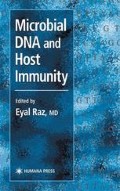Abstract
The etiology of human inflammatory bowel disease (IBD) is not yet known, and its pathogenesis is also poorly understood. At present, an uncontrolled or downregulated cellular immune response to an unknown trigger seems to play an important role. CD4+ T-cells were suggested to have a central role in the pathogenesis of experimental colitis (1) and human IBD, since in the latter, the CD4+ T cell pool is expanded both in the peripheral blood and in the inflamed mucosa (2). The balance between the three subsets of CD4+ T cells, which is well regulated under normal circumstances, is interrupted in several disease states. Human Crohn’s disease (CD) is thought to be characterized by Th-1 response, which produces IL-2, IFN-γ, and tumor necrosis factor (TNF-α). Ulcerative colitis (UC) is dominated by Th-2 response, which produce antiinflammatory cytokines, such as; IL-4, IL-5, and IL-10. Models of experimental colitis also vary according to the dominant phenotype of Th-1 or Th-2 response. Spontaneous colitis in IL-10 knockout (KO) mice is mediated predominantly by Th-1 response (3). Tri or dinitrobenzene sulphonic acid induced colitis is characterized by predominant Th-2 response, and in this respect mimics UC (4). Administration of dextran sodium sulphate (DSS) to immune competent mice induce acute and chronic colitis, with features characteristic of a mixed Th-1/Th-2 response (1).
Access this chapter
Tax calculation will be finalised at checkout
Purchases are for personal use only
Preview
Unable to display preview. Download preview PDF.
References
Blumberg, R. S., Saubermann, L. J. and Strober, W. (1999) Animal models of mucosal inflammation and their relation to human inflammatory bowel disease. Curr. Opin. in Immunol. 11, 648–56.
Sartor, R. B. (1997) Pathogenesis and immune mechanisms of chronic inflammatory bowel diseases. Am. J. Gastroenterol., 92, 5S-11S.
Davidson, N. J., Fort, M. M., Muller, W., Leach, M. W., and Rennick, D. M. (2000) Chronic colitis in IL-10-/- mice: insufficient counter regulation of a Thl response. Int. Rev. Immunol., 19, 91–121.
Dohi, T., Fujihashi, K., Rennert, P. D., Iwatani, K., Kiyono, H., and McGhee, J. R. (1999) Hapten-induced colitis is associated with colonic patch hypertrophy and T helper cell 2-type responses. J. Exp. Med. 189, 1169–1180.
Martin-Orozco, E., Kobayashi, H., Van Uden, J., Nguyen, M. D., Kornbluth, R. S., and Raz, E. (1999) Enhancement of antigen-presenting cell surface molecules involved in cognate interactions by immunostimulatory DNA sequences. Int. Immunol. 11, 1111–1118.
Krieg, A. M. and Yi, A. K. (2000) Rescue of B cells from apoptosis by immune stimulatory CpG DNA. Springer Semin. Immunopathol. 22, 55–61.
Rachmilewitz, D., Karmeli, F., Raz, E. (2000) Immunostimulatory DNA sequences ameliorate the extent of experimental colitis in mice and rats. Gastroenterology 118, A576.
Rachmilewitz, D., Karmeli, F., Takabayashi, K., et al. (2002). Immunostimulatory DNA ameliorates experimental and spontaneous murine colitis. Gastroenterology 122, 1428–1441.
Bauer, M., Heeg, K., Wagner, H., and Lipford, G. B. (1999) DNA activates human immune cells through a CpG sequence-dependent manner. Immunology 97, 699–705.
Sato, Y., Roman, M., Tighe, H., et al. (1996) Immunostimulatory DNA sequences necessary for effective intradermal gene immunization. Science 273, 352–354.
Horner, A. A., Van Uden, J. H., Zubeldia JM, Broide D, Raz E. (2001) DNAbased immunotherapeutics for the treatment of allergic disease. Immunological Reviews 179, 102–118.
Cho, H. J., Takabayashi, K., Cheng, P. M., et al. (2000) Immunostimulatory DNA-based vaccines induce cytotoxic lymphocyte activity by a T-helper cellindependent mechanism. Nature Biotechnol. 18, 509–514.
Stacey, K. J., Sester, D. P., Sweet, M. J., and Hume, D. A. (2000) Macrophage activation by immunostimulatory DNA. Curr. Top. Microbiol. Immunol. 247, 41–58.
Yi, A. K., Hornbeck, P., Lafrenz, D. E., and Krieg, A. M. (1966). CpG DNA rescue of murine B lymphoma cells from anti-IgM-induced growth arrest and programmed cell death is associated with increased expression of c-myc and bcl-xL. J. Immunol. 157, 4918–4925.
Chu, W. M., Gong, X., Li, Z. W., et al. (2000) DNA-PKcs is required for activation of innate immunity by immunostimulatory DNA. Cell 103, 909–918.
Ligumsky, M., Simon, P. L., Karmeli, F., and Rachmilewitz, D. (1990) Role of interleukin 1 in inflammatory bowel disease enhanced production during active disease. Gut 31, 686–689.
Van Deventer, S. J. (1997) Tumor necrosis factor and Crohn’s disease. Gut 40, 443–448.
Targan, S. R., Hanauer, S. B., van Deventer, S. J., et al. (1997) A short-term study of chimeric monoclonal antibody cA2 to tumor necrosis factor alpha for Crohn’s disease. Crohn’s Disease cA2 Study Group. N. Engl. J. Med. 337, 1029–1035
Editor information
Editors and Affiliations
Rights and permissions
Copyright information
© 2002 Humana Press Inc., Totowa, NJ
About this chapter
Cite this chapter
Rachmilewitz, D., Karmeli, F., Leider-Trejo, L., Takabayashi, K., Hayashi, T., Raz, E. (2002). Effects of Immunostimulatory DNA Oligonucleotides on Experimental Colitis. In: Raz, E. (eds) Microbial DNA and Host Immunity. Humana Press, Totowa, NJ. https://doi.org/10.1007/978-1-59259-305-7_30
Download citation
DOI: https://doi.org/10.1007/978-1-59259-305-7_30
Publisher Name: Humana Press, Totowa, NJ
Print ISBN: 978-1-4684-9728-1
Online ISBN: 978-1-59259-305-7
eBook Packages: Springer Book Archive

